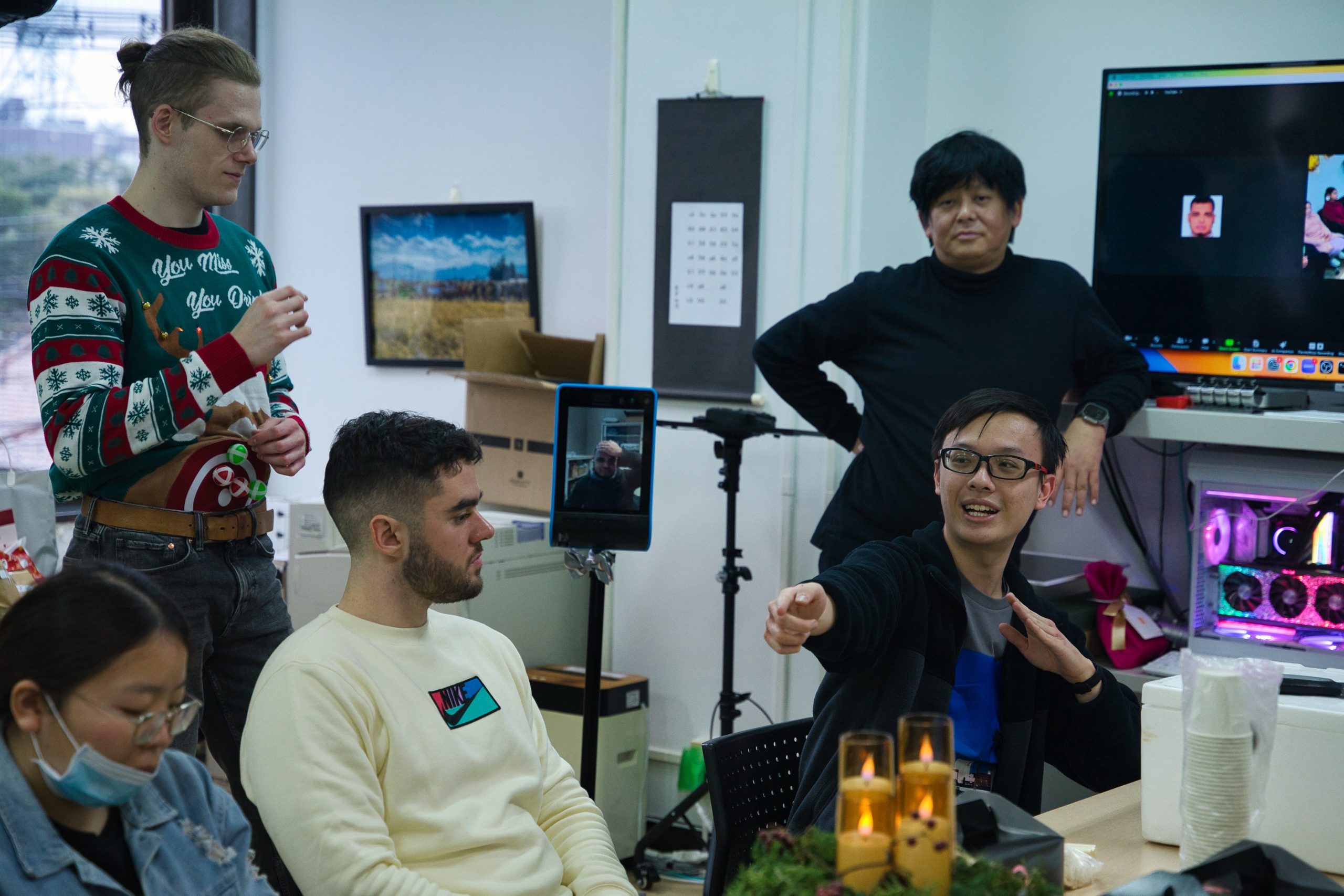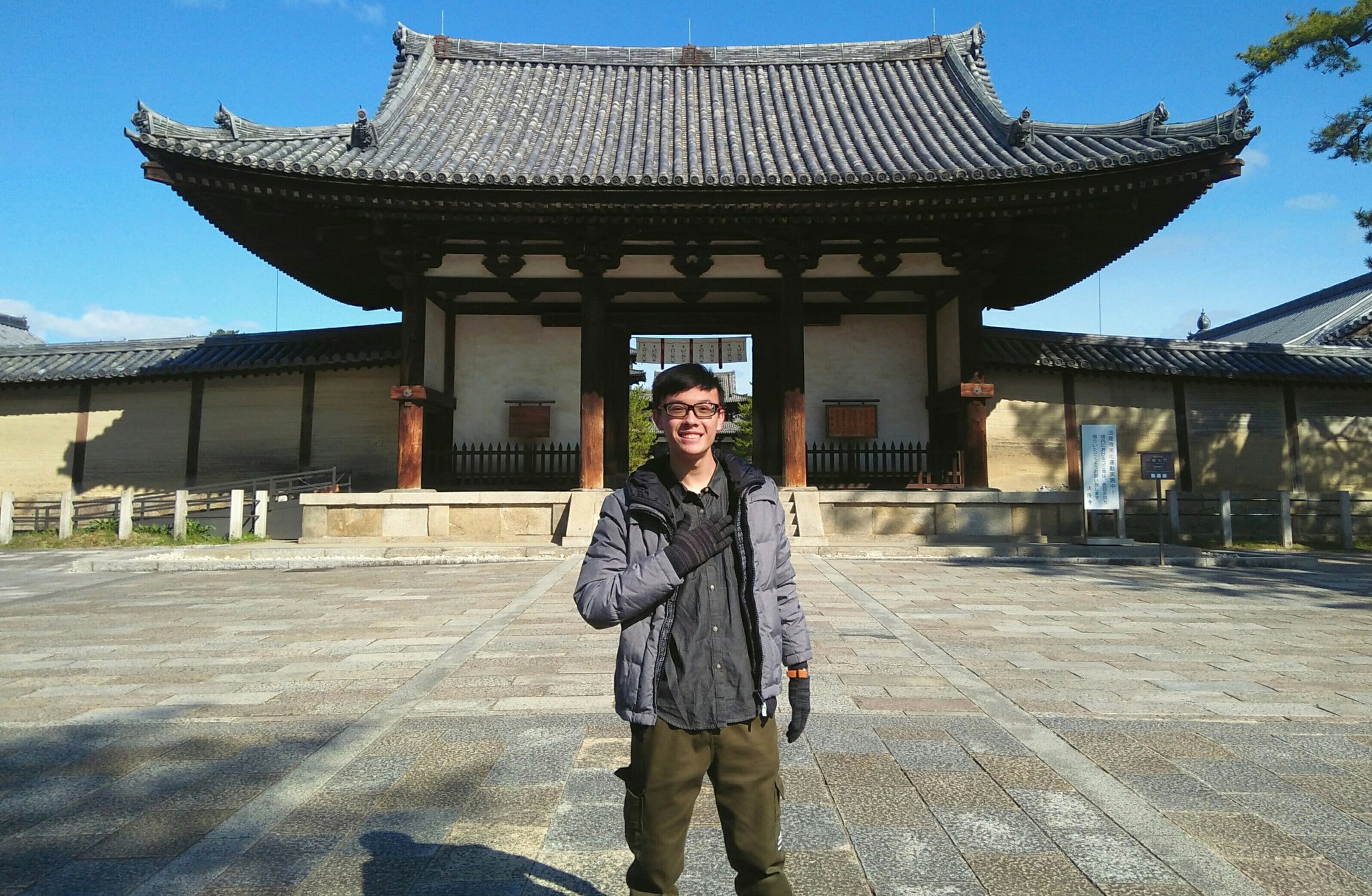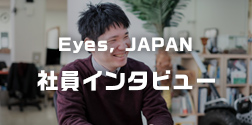Eyes, JAPAN
Eyes, JAPAN Employee Interview [Vol. 26]
Angelita
The special series to put a spotlight on our international staff, “Eyes, JAPAN employee interview” is back! Our second interviewee of this year is Jun Wen from Singapore.
He did an internship in Eyes, JAPAN for around one and a half months. We want to ask him about his experience living in Aizu and working in Eyes, JAPAN!
(Interviewer: Angie)
Loves Drawing, Composing, and Teaching!
What is your favorite thing about your home country or home town?
Jun Wen: Daily life is convenient to carry out. Matters like finding food and groceries, and public transport, can be settled without much hassle at all. Having a smooth time with the tasks of daily life is a great privilege since it leaves you with more headspace for your other commitments.
Why did you come to Japan and what do you like about Japan?
Jun Wen: I’ve previously been to Japan before, and as someone who speaks the language and has many friends who live in Japan, its culture of courtesy has captivated me greatly. The way in which many Japanese people live their lives and work with the ideas of communal responsibility and an appreciation for harmony is definitely not something every neighborhood or every workplace has the privilege of enjoying.
What do you think about life in Aizu?
Jun Wen: Aizu is a suburban area, so relative to the “brainlessly easy to live in” style of Singapore, it sure was a large contrast. For example, shopping malls aren’t exactly a thing in Aizu. But, just as Singapore is a city in nature, so too does Aizu have its landscapes respectfully Integrated into nature, and so life in Aizu gives you many chances to slow down and catch your breath — like taking a break at a nearby hilltop temple, or soaking in the hot springs — from the usual “rush” of 21st century living.
What is your favorite way of spending your holidays in Aizu?
Jun Wen: A variety of scenic options are available when it comes to visiting places of worship in Aizu, and so it is that I found myself going to these places whenever there was free time to enjoy. With nature being so easily accessible, all kinds of cool or silly photos can be taken of Aizu, or with friends, or with your plush toys (how idiosyncratic…).
What is your hobby?
Jun Wen: I like to draw and compose music. As a Touhou Project fan, I play its STGs (shooting games) often too.
How do you usually spend your free time?
Jun Wen: Beyond playing video games and pursuing my hobbies of drawing and composing music, I like to spend time coaching and tutoring others, be it voluntarily or as a part-time job. I particularly enjoy teaching people about how to develop confidence in their writing and speaking skills, as well as teaching people about mathematics in a way that suits their current level of knowledge.
Jun Wen: Everyone should be given a chance to learn how to express themselves comfortably. Embrace sesquipedality, if that is your calling! Be a comedic speaker in your daily life, if that is the style you want to rock with! As for the mathematics, teaching people about logical thinking, and then especially how the math they learn in school is useful in real life, is personally gratifying for me.
What is your academic background and what kind or research are you doing or have you done before?
Jun Wen: I am an Applied Mathematics major in the National University of Singapore (NUS). My areas of study focus on using differential equations to perform mathematical modelling. My undergraduate research focuses on the study of dynamical systems, as well as generating upper bounds for various kinds of variables and error terms encountered in the comparison of different mathematical models.
Interesting Project: New Math Problem for EJ’s WIFI!
How did you know about Eyes, JAPAN? And why did you decide to join Eyes, JAPAN?
Jun Wen: My studies in NUS gave me the chance to meet Yamanaka Kaori of Konan University (甲南大学), an associate of Yamadera-san’s. She introduced him and I to each other, and from there our partnership began. I wanted to challenge myself with an overseas internship opportunity. A rapidly-expanding start-up firm like Eyes, JAPAN is a great environment for me to not only push myself towards sharpening my computing skills, but also to put to practice the mathematics and Japanese that I had learned.
Do you have any job experiences before joining Eyes, JAPAN?
Jun Wen: I previously spent time teaching children about programming in Coding Lab (Singapore), and also worked as a tutor (both independently and with tuition centres) for Singaporean secondary school English, mathematics, physics, and chemistry. Beyond that, being a Singaporean meant I spent two years in the army, where I spent much time conducting geographical studies via GIS (geographic information system) programs.
What is your role and what kind of projects have you been working on in Eyes, JAPAN?
Jun Wen: My time in Eyes, JAPAN was spent on learning web development, and on translating internal documents for the company.
Could you let us know your most memorable project in Eyes, JAPAN?
Jun Wen: A short, but curious project I got was to come up with a mathematics problem which, when solved, would produce the information needed to access the WiFi account for guest usage. The former problem put in place was a Laplace transform computation, which, while looking impressive, was unenlightening, since it presented no chances for mathematical and logical thinking. Worse still, anyone who didn’t know what the Laplace transform was would be dead-stuck from the get-go.
Jun Wen: Thus, I mulled it over, and eventually crafted a probability problem. Without spoiling the problem here online, what I can say is that the word problem describes actual phenomena that can be visualized or even set-up in real life, and so no hyper-specific mathematical knowledge is demanded. All that is needed is the logical thinking skill necessary to interpret the problem, and come up with a mathematical framework to solve it. In other words, it was a test of problem-solving, in the end — that’s part of mathematics too.
(As for the actual mathematics truly needed? Just middle school calculus. Our secret.)
What customs in Eyes, JAPAN that you like the most?
Jun Wen: The weekly meetings we have on Thursday evenings are a great chance to learn about other cultures, other academic disciplines, and other skills. This is particularly pertinent for Eyes, JAPAN, where we enjoy having a diverse team full of people all brimming with passion and all kinds of knowledge. Knowledge is power, and with a stunningly skilled cast like this, it allows us to create opportunities for everyone to share knowledge and continually learn from each other, and so our weekly meetings facilitate exactly that.
What do you think about your colleagues in Eyes, JAPAN?
Jun Wen: I am constantly impressed with the depths of everyone’s expertise. Everyone has their educational qualifications, certainly (and they sure are robust!), but more importantly, everyone is a subject matter expert in their own domain, be it UX design, computer vision, or web development. Everyone is also very friendly and welcome to both teaching others and learning from others, and so I felt as though my colleagues in Eyes, JAPAN and I truly formed a community, unified in both our shared goals and our common appreciation of learning from experts like, well, each other.
What about the working environment in Eyes, JAPAN?
Jun Wen: When everyone around you is skilled in their own field, an environment that encourages continuous learning and doing your best is established. Moreover, the way in which Eyes, JAPAN’s company customs ensures colleagues are in frequent communication with each other builds a very positive working environment, where everyone is a team player, and everyone knows of each other’s goals, and can help out as needed. This “helping out” goes beyond work matters, such as if a fellow colleague needs help with transportation, or with arranging plans for an occasion, for example.
Jun Wen: The physical environment itself is also conducive for working, with multiple rooms available for you to choose the kind of working space that suits you, ample heaters to combat the winters of Fukushima, and refreshments constantly available to keep you fueled up if necessary.
What kind of problems or challenges have you faced while working in Eyes, JAPAN, and how did you solve it?
Jun Wen: The self-inflicted challenge for me was that I was coming in as a total greenhorn to all things programming. By speaking with fellow interns and the other full-time staff, we were able to come up with a study plan that would allow me to learn the skills I would need to contribute to the company’s efforts to update its website. I got to, starting from knowing nothing at all, learn from the full-time staff and fellow interns how to use HTML, then CSS, then Tailwind, to carry out web design and go deep into how to categorize and lay out information in accordance with working requirements.
Dream: To Be A Master Of All Trades
Have you experienced any culture shock while working in Japan?
Jun Wen: There was little culture shock — Japan and Singapore share similar working cultures, even if the living cultures do indeed differ.
Can you give some pros and/or cons of working at a Japanese company?
Jun Wen: I appreciate the stability and sense of unity that Japanese workplaces have. It can probably be attributed to Japanese society’s emphasis on communal values and responsibility, but it is easy to feel like being part of a team of professionals when in a Japanese company, and that kind of feeling is empowering, particularly for young adults fresh into their working life.
Jun Wen: The main con of working in a Japanese company is the language barrier. Communicating about work and non-work topics, with people inside and then people outside of the company, demands a lot of effort. Even for me — I am fluent in English, Mandarin Chinese, and Japanese — I always felt like my communication skills were constantly put to the test, such as when hosting Japanese visitors to the company, or answering a colleague’s request on advice to approach a problem.
How do you balance your working and private time?
Jun Wen: If you have to balance work, study, and private time, then you naturally will, because you have to. In that sense, the key word is “naturally” — you know yourself best, so plan your time around the strengths and weaknesses you naturally have. For instance, study time and private time can be split up to ensure that the study times line up with the times of the day in which you know you tend to learn better.
Jun Wen: Note also that in the case of Eyes, JAPAN, some flexibility within reason is allowed regarding working hours. If you know you really will need to shift a little time from work to other commitments, plan for that in advance and inform your colleagues accordingly. Then, you can come in later, leave earlier, etc. Your team in Eyes, JAPAN are your allies, not your enemies — why shouldn’t you collaborate with them, to manage your work, study, and private time?
Any advice for people who wants to work in Japan?
Jun Wen: As the foreigner, you are obligated to keep an open mind, and do your best to harmoniously fit into the culture of whatever country you are visiting. In the case of Japan, one particular point of note is that making an honest effort to learn the language will go a long way. After all, even if everyone at work can speak English, that won’t help you once you’re carrying out your daily tasks with other Japanese people, or if you’re confronted with paperwork. If you do want to try working in Japan, then chances are, you’re looking forward to trying to settle down in this new culture anyway, so embrace that eagerness, and also do your best to learn the basics of Japanese.
What motivates you to keep working or studying?
Jun Wen: There’s always a chance to learn something new every day, so why wouldn’t you take this free chance? Come on, Singaporeans love freebies. So that means being open to working and studying (at a comfortable pace, of course). But that is about motivation. For many, including myself, I suspect the bigger problem is about discipline. Having good friend groups is thus also helpful; seeing everyone you know and like being earnest in trying their best to continuously improve will keep your discipline strong, while you continue to work and learn day-by-day.
Lastly, what is your dream?
Jun Wen: In the next five years, I’d like to gradually build up my expertise and be slightly expert-like — like my colleagues in Eyes, JAPAN are — in a bit of everything that I’m interested in, such as mathematical modelling and data analytics. Being a “master of all trades,” if at all possible, is worth striving for, in my opinion, since that empowers me to be able to spread knowledge in the fields I’m interested in to the people around me, which I consider one of the most satisfying things in life… like performing consulting but for a bit of everything in life. That kind of mental resourcefulness is cooler than just aiming for, say, a specific job title or specific number value for your bank account.
Thank you!
If you are interested in Eyes, JAPAN and would like to hear other stories, please do not hesitate to contact us at the following contact form.
Everyone welcome.




 2024/04/23
2024/04/23 2024/03/26
2024/03/26 2024/02/23
2024/02/23 2024/02/09
2024/02/09 2024/02/02
2024/02/02 2024/01/23
2024/01/23 2024/01/12
2024/01/12